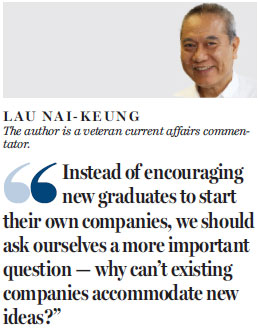Too many assumptions surround innovation and entrepreneurship
Updated: 2016-11-01 09:53
By Lau Nai-keung(HK Edition)
|
|||||||||
Innovation and entrepreneurship are crucial to the continuous progress of our society. These two activities are nothing new, and therefore the recent emphasis on them is worth looking into.
An innovation is simply a new idea, a new device, or a new method (aka business model), or the act or process of introducing new ideas, devices, or methods. Entrepreneurship has traditionally been defined as the process of designing, launching and running a new business, which typically begins as a small business such as a startup company offering a product, process or service for sale or hire, and the people who do this are called "entrepreneurs".
It is interesting that recently people are always putting innovation and entrepreneurship into one single phrase, as if they have some sort of definite connection. Do innovations only happen in startups? Of course not. In fact, it can be argued that big corporations and governments create the majority of important technological breakthroughs. Think Bell Labs, Apple, and the US military-industrial complex.
Looking at the relationship the other way round, are small businesses usually those with new ideas, devices or methods? Nope. In most cases, entrepreneurs merely identify business opportunities - such as a neighborhood lacking an upscale restaurant - and take the risks.
Don't get me wrong; entrepreneurship creates value even though it might not be the most innovative sector. The world would be much worse off if entrepreneurs did not go into, for example, parallel trading.
Nowadays, we associate innovation with entrepreneurship because young science nerds are getting big venture capital funding for their startup ideas. This phenomenon brings us to two further assumptions. The first is that these talents and their new ideas are not appreciated in "traditional companies", and second, people innovate chiefly because they want to get rich.
These assumptions are flawed at best. At worst, this mistaken understanding about the role and value of corporations can be dangerous from a macroeconomic standpoint.
Contrary to common belief, scientific breakthroughs are not driven primarily by monetary concerns. Nicolaus Copernicus would be heartbroken if such a notion were even uttered.
More often, scientists are forced to pursue their ideas through a new venture because their former employers cannot appreciate their ideas. But with newly found autonomy there comes new responsibilities - operations, sales and marketing, etc. Technical gurus are often ill adapted to these roles.
Instead of encouraging new graduates to start their own companies, we should ask ourselves a more important question - why can't existing companies accommodate new ideas?
Every company is looking for the magic formula that will produce breakthrough products and services. But a better starting point is to think about what gets in the way of innovation, especially in firms that already have lots of talented, creative and motivated people.
Gary Hamel, one of the world's most influential and iconoclastic business thinkers, rightly pointed out that in a big company, "strategy gets set at the top. Power trickles down. Big leaders appoint little leaders. Individuals compete for promotion. Compensation correlates with rank. Tasks are assigned. Managers assess performance. Rules tightly circumscribe discretion."
In other words, by identifying and removing barriers, it might be possible to accelerate innovation simply by leveraging the capability that's already there.
Government and regulators also get in the way of innovation. The whole sharing economy thing is all about deregulation. Take cab-sharing for example; as with Uber elsewhere in the world, the rapid development of Didi Chuxing on the mainland has had a huge impact on the traditional taxi business, and has pushed the sharing economy to the forefront in various sectors.
The revolution in the transport model has brought about a structural change in the market, but there is political resistance. Although the Ministry of Transport has come out in favor of online taxi-hailing apps, and Premier Li Keqiang continues to encourage the use of internet technology to create innovation, a very different reaction is happening at the local level. Various cities have announced new regulations that will fundamentally restrict the development of mobile ride-sharing apps.
The same is happening in Hong Kong where innovations are supposed to thrive in the freest economy in the world. Instead, Uber is suppressed in favor of online taxi-hailing apps.
If our government can streamline regulations on taxis proactively, more traditional car service companies can join the game and have a share of the market instead of what is happening now - a new monopoly enabled by an excess of capital.

(HK Edition 11/01/2016 page1)